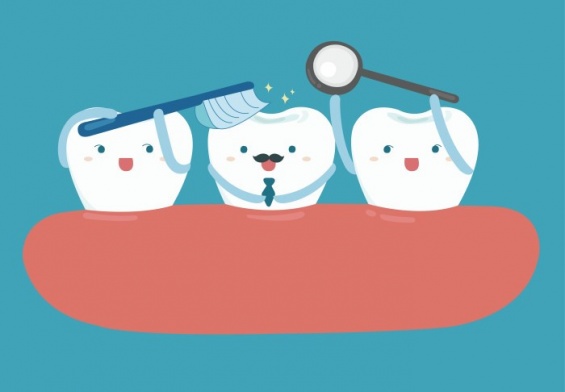If you’ve ever woken up with an unpleasant taste in your mouth and terrible, smelly breath, you’re not alone. Morning breath, also known as halitosis, is a common issue. It’s that pesky, stale odor that you notice after a full night’s rest. While it’s not a pleasant experience, understanding what causes it can help you take steps to reduce it. Let’s take a look at the factors behind morning breath and what you can do about it, with insight and advice from the best family dentists in Livingston.
Why Does Morning Breath Happen?
Morning breath happens because your mouth is a natural breeding ground for bacteria. At night, when you’re asleep, conditions in your mouth change, and those changes cause it to produce more of those foul-smelling compounds.
The Culprits Behind Morning Breath
Decreased Saliva Production
During the day, your saliva works hard to keep your mouth clean by washing away food particles and bacteria. Saliva also contains enzymes that break down bacteria and neutralize odors. However, you produce much less saliva when you’re sleeping at night. The lack of saliva creates a dry environment that allows odor-causing bacteria to thrive and multiply.
Morning breath is usually worse in those who sleep with their mouths open or breathe through their mouths. The problem is worse if you snore because mouth breathing dries out the mouth even more. Saliva acts like a natural cleanser, so when the flow is low, bacteria can grow and release sulfur compounds, which are responsible for that unpleasant morning odor.
Bacterial Growth
The bacteria that live in your mouth play a huge role in causing bad breath, especially in the morning. These bacteria are anaerobic, meaning they thrive in oxygen-poor environments. While you sleep, your mouth is mostly closed, creating a perfect low-oxygen environment for these bacteria. As they break down food particles and dead cells in your mouth, they release volatile sulfur compounds (VSCs), which are the primary source of bad odors.
Bacteria also feed on plaque, which forms on your teeth and gums if you don’t clean them properly. When plaque isn’t removed, it hardens into tartar, which creates even more space for bacteria to hide and multiply, increasing your chances of developing morning breath.
Mouth Breathing or Snoring
Do you wake up with a dry mouth? If so, mouth breathing or snoring might be contributing to your morning breath. When you breathe through your mouth while sleeping, it dries out the saliva in your mouth. As mentioned earlier, saliva helps keep bacteria in check, so when your mouth dries out, bacteria can grow unchecked.
Mouth breathing is often linked to snoring or conditions like nasal congestion, allergies, or sleep apnea. If you sleep with your mouth open, your mouth dries out even more, making it easier for bacteria to multiply and produce bad odors.
Food Choices
What you eat before bed can have a significant impact on your morning breath. Foods like garlic, onions, and certain spices are notorious for causing bad breath, even after you’ve brushed your teeth. These foods contain sulfur compounds that enter your bloodstream and are eventually exhaled through your lungs, contributing to lingering bad breath even in the morning.
Additionally, sugary foods and drinks can encourage the growth of bacteria in your mouth, which thrive on sugar. This not only increases your risk of cavities but also leads to the production of VSCs, worsening your morning breath.
Poor Oral Hygiene
Neglecting proper oral hygiene is a significant cause of morning breath. If you don’t brush and floss before bed, food particles and plaque remain in your mouth, allowing bacteria to grow. These bacteria feed on food debris, releasing foul-smelling compounds as they break it down.
Skipping your nighttime brushing routine also allows plaque to harden into tartar, which not only increases your risk of gum disease but also creates a haven for odor-causing bacteria. Tongue cleaning is another often-overlooked step in preventing bad breath, as bacteria can accumulate on your tongue throughout the day.
Underlying Health Conditions
In some cases, persistent morning breath could be a symptom of an underlying health condition. Conditions like gum disease, respiratory infections, acid reflux, or even uncontrolled diabetes can all contribute to bad breath. Gum disease, in particular, is caused by a buildup of plaque and bacteria, leading to inflammation and infection of the gums, which can produce a strong odor.
Acid reflux (GERD) can also cause bad breath because stomach acids may reach the throat and mouth, creating an unpleasant smell. Diabetes, when poorly controlled, can lead to a condition called diabetic ketoacidosis, which can result in a sweet or fruity breath odor that’s still unpleasant.
How to Minimize Morning Breath
Luckily, there are several steps you can take to reduce or even eliminate morning breath:
- Brush and Floss Before Bed: Make sure to brush for at least two minutes and floss to remove food particles that can feed bacteria overnight.
- Stay Hydrated: Drinking water before bed and keeping water nearby can help maintain saliva production and keep your mouth moist.
- Use a Tongue Scraper: Bacteria can also accumulate on the tongue. Using a tongue scraper or brushing your tongue can help reduce the bacteria responsible for bad breath.
- Mouthwash: Antibacterial mouthwash before bed can help kill odor-causing bacteria, leaving your mouth fresher in the morning.
- Avoid Certain Foods: Foods like garlic, onion, and certain spices can cause bad breath, and sugary snacks or drinks make your mouth’s ecosystem more conducive to VSC-producing bacteria. Therefore, you should limit your intake of these foods to keep your breath fresh.
When to See a Dentist
If you notice that your morning breath sticks around even though you’re practicing good oral hygiene, it could be a sign of an underlying dental or health issue. The best family dentists Livingston residents trust recommend regular check-ups to keep your mouth healthy and free from disease. If you’re concerned about your morning breath, schedule an appointment with your local dentist to rule out any potential problems.
Keeping Morning Breath at Bay
Morning breath is a common but manageable condition. With proper oral hygiene and attention to your nighttime routine, you can minimize the impact of morning breath. And remember, if you’re in the Livingston area and need professional advice or a thorough check-up, the best family dentists in Livingston are here to help keep your smile fresh and healthy!




